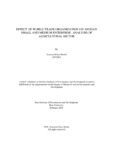| dc.contributor.advisor | Hossian, Shanawez | |
| dc.contributor.author | Khalid, Zamarod Khan | |
| dc.date.accessioned | 2020-03-04T09:48:58Z | |
| dc.date.available | 2020-03-04T09:48:58Z | |
| dc.date.copyright | 2020 | |
| dc.date.issued | 2020-02 | |
| dc.identifier.other | ID 19372011 | |
| dc.identifier.uri | http://hdl.handle.net/10361/13828 | |
| dc.description | This thesis is submitted in partial fulfillment of the requirements for the degree of Masters of Arts in Governance and Development, 2020. | en_US |
| dc.description | Cataloged from PDF version of thesis report. | |
| dc.description | Includes bibliographical references (pages 62-65). | |
| dc.description.abstract | The United Nations, the World Bank, the Security Council, the International Monetary Fund and the World Trade Organization is playing important role in different global social, economic and security aspects. Particularly, in the fields of global trade and business WTO is playing the most important role by setting rules of games. So, countries join in WTO to promote trade and development. Similarly, analysis of this research shows since war torn Afghanistan joined the WTO in its exports have soared, and the government has been to some extent successful in its anti-dumping policy. Particularly, in agriculture related SMEs WTO accession shows many positive signs by promoting both internal and external growth of the sector. Related farmers and business associations also confirmed this. However, numerous challenges also emerged as the country’s economy is still immature and internal environment is not settled. Some other related challenges include very low level of government measures to protect domestic industries, import of foreign industrial goods in the absence of customs barriers, government failed policies to improve the status of these businesses. Accordingly, respondents identified security, insufficient power and improper work environment as challenges to farmers and agricultural product’s wholesalers of Afghanistan due to WTO accession. Therefore, it is necessary to take proper policy measure to remove these barriers to make the country’s economy sustainable by taking the opportunity of WTO accession. | en_US |
| dc.description.statementofresponsibility | Zamarod Khan Khalid | |
| dc.format.extent | 68 pages | |
| dc.language.iso | en | en_US |
| dc.publisher | Brac University | en_US |
| dc.rights | Brac University theses are protected by copyright. They may be viewed from this source for any purpose, but reproduction or distribution in any format is prohibited without written permission. | |
| dc.subject | World Trade Organisation (WTO) | en_US |
| dc.subject | Afghanistan small & med-size enterprise | en_US |
| dc.subject | Accession | en_US |
| dc.subject | Agriculture | en_US |
| dc.subject.lcsh | Small business--Government policy | |
| dc.title | Effect of World Trade Organization on Afghan small and medium enterprise: analysis of agricultural sector | en_US |
| dc.type | Thesis | en_US |
| dc.contributor.department | Brac Institute of Governance and Development, Brac University | |
| dc.description.degree | M. Governance and Development | |

